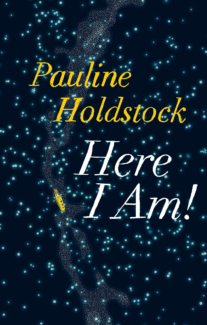An Interview with Pauline Holdstock, Author of Here I Am!
MyMum said sometimes refugees don’t eat anything for days and days. Sometimes weeks and months so I am really lucky. I think she exaggerates. But I think she is right about the lucky bit. Or maybe not.
Sometimes I forget that MyMum is dead. But that is probably better than remembering.
When Frankie’s mother dies, he tells his teacher, of course. But he can’t seem to get anyone at his school in southern England to listen to him. So the six-year-old comes up with a plan: go to France, find a police station, and ask the officers to ring his father. Thus a stowaway’s view of the sea opens Giller-nominated Pauline Holdstock’s eighth novel, narrated in turns by Frankie—who likes cheese, numbers, the sea when it’s pink and “smooth like counting,” and being alone when he feels bad—and a cast of characters that includes his worried Gran, his callous teacher, and his not-so-reliable father. Set in the summer of Annichka the Soviet space dog, Here I Am! is a mesmerizing story about the lucidity of children and the shortsightedness of adults.
A Biblioasis Interview with Pauline Holdstock, author of Here I Am!
For those who are coming to your work for the first time, can you tell us a little about yourself and your writing?
I was born and raised in the UK and immigrated to Canada in my twenties.
I’m primarily a fiction writer—novels and short stories—though I also write essays and occasionally short shorts, my closest approach to poetry.
I’m drawn to subjects that offer a chance to explore the deepest shadows, but I’ve always steered clear of material too close to home. For that reason I’ve set my novels far afield, in time or in place. In Here I Am! I’ve decided to work closer to home, giving my protagonist, Frankie, a background not so far from my own very ordinary childhood in England, but subjecting him to a place of extremity.
Three of your books have had child protagonists. What is it that draws you to children’s points of view?
Possibly two influences at work there. The first is that, like most people, I’m always on the side of the underdog, consistently drawn to the plight of the most vulnerable and interested in having them find the wherewithal to overcome their situation.
The second is that I believe the quality we revere in children—that ability to experience life unreservedly, to the utmost—is a quality that once belonged to us all, before adulthood eroded it. Children have the power to reawaken that ability and also perhaps to reveal facets of ourselves long-hidden to us.
How is Frankie different from other child protagonists you’ve written?
The others have been marginal characters on the very fringes of society, dispossessed yet yearning to belong. Frankie belongs to the mainstream, yet is set apart by his exceptional abilities and his own singular response to the world.
He’s the only child protagonist of mine to tell his own story.
Your novel is quite humorous, but it deals with serious themes: death, loss, and grief, for example, and our tendency to dismiss what vulnerable people tell us. Talk a little bit about the value of humour when exploring serious topics.
Well I think no one is open to the bald message: Death is the pits and we’re all gonna die. That message doesn’t lead to compassion or empathy for ourselves or anyone else. But humour has the potential to take us closer to fellow feeling, to summon a little compassion for all of us sharing this predicament.
And humour’s a valuable tool when you’re working with unpleasant characters. It proved invaluable for the David and Goliath situations that cropped up throughout the book. Definitely the sharpest tool in the box…
What are you reading right now?
Three books currently at my bedside: Find You In the Dark by Canadian writer Nathan Ripley, Do Androids Dream of Electric Sheep? by Philip K. Dick, and Tristram Shandy by Laurence Sterne, whose sense of the absurd is boundless.



